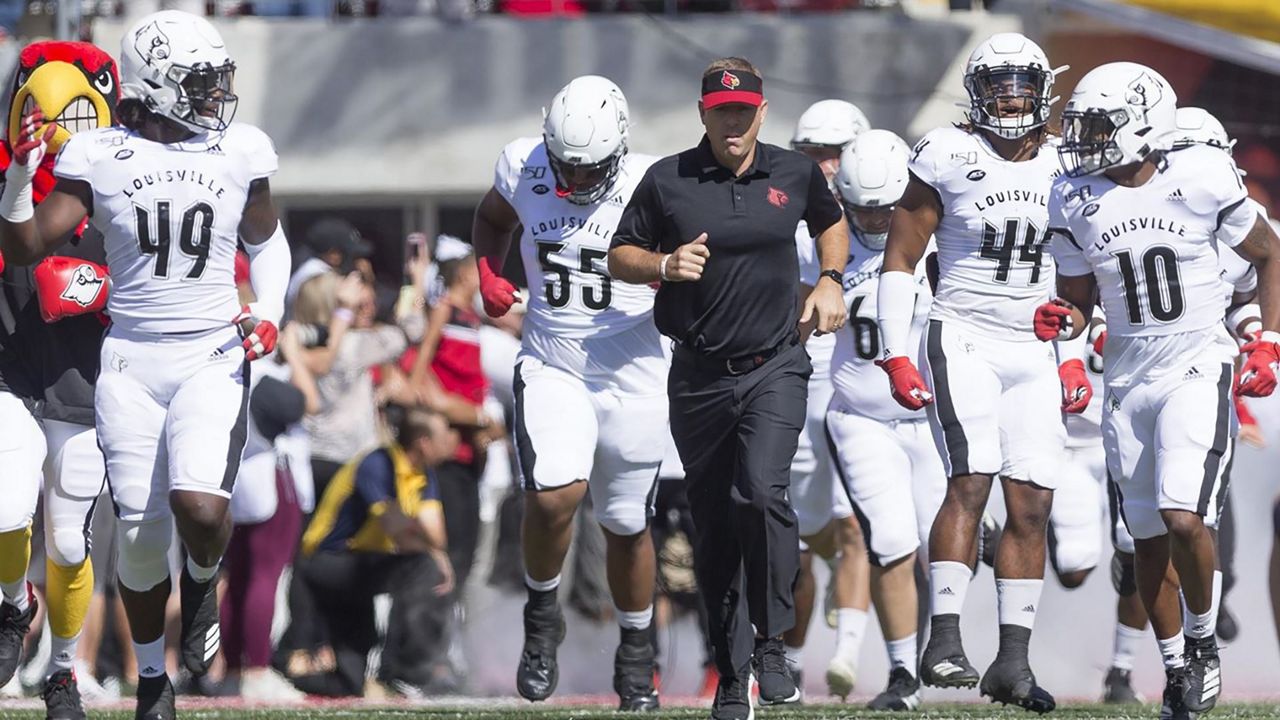INDIANAPOLIS, In. — College campuses across Kentucky and the country are wondering what football season will look like in 2020. The pandemic halted spring practice for most colleges but the NCAA has a plan that would extend the preseason by two weeks to help coaches and players make up for the lost time.
The NCAA's football oversight committee expects to finalize a plan Thursday allowing teams to hold 12 walk-throughs, which are unpadded, slow-speed practices, two weeks before the typical preseason begins in August.
Under the plan, schools will be allowed to work with student-athletes for 20 hours per week with what it calls "countable athletically related activities." This will lead teams into their normal 29-day preseason practice schedule. The walk-throughs will be part of the 20 hours per week along with weight training, conditioning, film study, and meetings. Players cannot wear pads or helmets during walk-throughs and those cannot last longer than one hour per day.
University of Louisville Assistant Sports Information Director for Football, Rocco Gasparro said any extra time between coaches and student-athletes is good.
"(It) gives coaches hands-on instruction time to teach offense and defense; making up for the time they lost this summer. So this is an extreme benefit to the coaches, which will help them in preparation for the season. It also eliminates having to waste time in practice re-teaching. A lot of schools didn’t have spring football either so lots of instruction time missed. It also helps our freshmen and newcomers get acclimated."
The football oversight committee has given schools its proposed schedule as a way to get feedback.
West Virginia athletic director Shane Lyons said he doesn’t expect much to change before it is taken to the Division I Council for approval next week. The council meets on June 17.
“I think there’s been a lot of collaboration among the conferences,” Lyons said.
UofL began its phased return of student-athletes to campus Monday and in the first three days, things have gone well. Football players started workouts Monday. Players are being tested and screened for COVID-19 and will continue to be monitored for the coronavirus.
Under the oversight committee’s plan, this period of voluntary activities would run until about July 12, depending on the exact date of a team’s opening game.
That will be followed by two weeks of summer access, which usually happens earlier in the year. During that time, coaches can require up to eight hours per week of weight training, conditioning, and film study. Lyons said if any tweaks are made to the plan before it goes to the council they would likely be made to these two weeks.
Around July 24, the meetings and walk-throughs can begin. Then 29 days before a team’s first game, the usual preseason practice period starts. UofL's first game is set for Thursday, September 3 and the University of Kentucky's first game is Saturday, September 5, making preseason starts for UofL on August 5 and August 7 for UK.
Lyons said teams will be required to complete at least the four weeks of standard preseason before playing a game.
There has been concern among NCAA officials and athletic administrators that some schools will not be able to start their preseason work soon enough to begin their seasons on time because of restrictions put in place by state and local authorities to fight the coronavirus.
Those fears seem to be easing now.
“It all gives us a little bit of relief knowing the campuses are starting to reopen and these student-athletes are back working out on campus,” Lyons said.
What will practice look like during a pandemic? The oversight committee won’t be in charge of those details. Each school will make those decisions using guidance from state and local health officials, but medical experts at the conference and NCAA level are also expected to provide guidance.
Todd Berry, executive director for the American Football Coaches Association, said he would expect some coaches to segment their teams, holding multiple practices per day.
Berry said when he was coaching he would use this approach to give players more repetitions and individual attention. Now it could be used to limit exposure just in case the player contracts the virus.
“The ones and threes practiced in the morning. Two and fours practiced in the afternoon,” he said.
Tulane team physician Greg Stewart, who is heading the American Athletic Conference’s COVID-19 advisory panel, said the hope is testing and screening of the players for the coronavirus will go well enough that players won’t need to use face coverings during practice.
“But the coaches and staffs would all wear N-95 masks,” Stewart said, referring to the highly protective masks often used by healthcare workers.
If facing coverings are needed for players, Stewart said neck gaiters — stretchy scarves made of lightweight, breathable material — could be the way teams go.
“If the group is spread out and socially distanced and they’re running and doing stuff like that, they don’t need to have that on,” Stewart said. “But they’d wear it around their neck. And when they come up as a group, then they pull it up and cover their mouth and nose up with it.”



